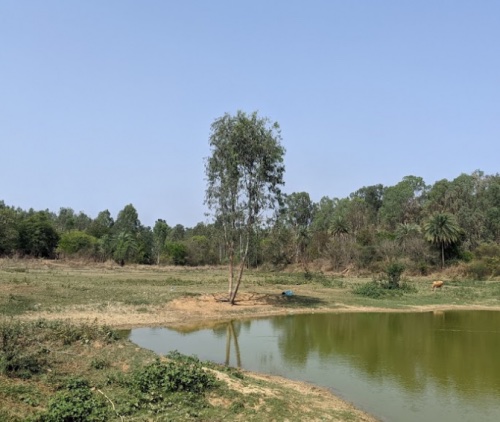The residents of East Bengaluru are worried of the worsening state of water bodies in villages outside BBMP limits, caused due to sewage and industrial pollutants. According to reports, the residents are concerned that the water bodies that were recently rejuvenated through CSR initiatives, are already in dire condition. One of the examples of such water bodies is the Mullur Lake in Kodathi village near Sarjapur Main Road.
Local lake activists have reported that the water body, that was developed just a year ago by an NGO in partnership with a private firm under CSR, has already degraded into a large septic tank, with unchecked sewage and industrial effluents flowing in.
“The lake underwent rejuvenation, but without a diversion channel, sewage from the entire catchment area flows directly into it. Over the last year, at least four to five commercial buildings, mostly paying guest accommodations, have come up in Ambedkar Nagar and nearly 10 more are under construction. Sewage from these buildings is entering the lake directly,” alleged Chetan Gopal, an environmental enthusiast in the area.
In response to these developments, the Kodathi Gram Panchayat office has issued notices to commercial establishments, requesting the submission of necessary construction permits. In addition, reports have indicated that industrial effluent is entering the lake from the vicinity of RGB Tech Park.
No Local Participation in Consultation for Rejuvenation
The locals have claimed that they were not involved in the consultation for rejuvenation. There are a total of 12 lakes in the area. While those not yet rejuvenated need to be developed, those rejuvenated through CSR funding are ailing. Apart from Mullur, other lakes in the area include Kachamaranahalli Lake, Sulikunte Lake, Kodathi Lake, Devarakere Lake, Hadosiddapura Lake, and Halanayakanahalli Lake.
The residents have also pointed out Heggondanahalli Lake as another water body in the area, that has met a similar fate. Hadosiddapura Lake was rejuvenated in 2019-20 and is in a bad state too. It is receiving a large volume of raw sewage from unregulated labor camps in the area. No guidelines are issued by the GP office on sewage management from these temporary camps. A resident has claimed that they also reached out to RERA, however, they cited their inability to help as they can only manage builders but not the subcontractors who hire labourers.
Accountability of CSR Projects
As per the city-based solid waste management experts, the Karnataka Tank Conservation and Development Authority (KTCDA) Act requires the authority’s technical approval before initiating the rejuvenation of water bodies. Therefore, NGOs and companies that sponsor such unscientific projects using CSR funds should also be held accountable if they proceed without proper approval.
“The majority of the CSR-based rejuvenation projects come with KTCDA-approved DPR. Thus, not just the NGO executing the project, but the CSR-funding agency should be held liable too. KTCDA is equally responsible for such illegal activities. The Authority is well aware of such cases but chooses to keep mum. This only goes to prove that KTCDA is hands-in-gloves. Immediate action is required to stop this corruption,” V Ramprasad, founder of Friends of Lakes has said.


